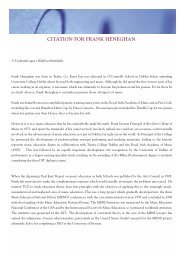TWICE THE SIZE - DIT Update - Dublin Institute of Technology
TWICE THE SIZE - DIT Update - Dublin Institute of Technology
TWICE THE SIZE - DIT Update - Dublin Institute of Technology
Create successful ePaper yourself
Turn your PDF publications into a flip-book with our unique Google optimized e-Paper software.
2. Corporately, the power <strong>of</strong> business is very different to the power <strong>of</strong> government.<br />
3.<br />
Corporations are concerned with markets, pr<strong>of</strong>its, growth, survival, competitive<br />
battles and the very complex issues <strong>of</strong> global management. They are far too busy to<br />
deal in a meaningful way with the issues governments wrestle with –- social and<br />
cultural matters, education, health and welfare, and collective safety and security.<br />
Nevertheless, in advanced economies, corporations, taken together, probably have<br />
more impact on people’s lives than government as the prime providers <strong>of</strong> goods and<br />
the principal source <strong>of</strong> employment. In this context, the trend over recent years<br />
towards increasing corporate social responsibility will grow and grow.<br />
Fiscally, global monetary policy will increasingly be determined by the world’s<br />
financial markets, through perverse subsidies, protectionist policies, and<br />
4.<br />
inappropriate measures <strong>of</strong> growth will continue to plague progressive governance.<br />
The concept <strong>of</strong> sustainable development will permeate policy making at all levels,<br />
and peace, non-violence and human security will increasingly be viewed as ‘public<br />
goods’. The issue <strong>of</strong> securing and sustaining both energy and water supplies is one<br />
which is certain to tax governance at all levels and in all sectors over the scenario<br />
period.<br />
5. There will be a constant progression towards democracy and away from<br />
authoritarianism, but the threat <strong>of</strong> theocracies through widespread fundamentalist<br />
thinking will be ever-present.<br />
6. Between now and 2030, transnational criminal organisations will become<br />
increasingly adept at exploiting the global diffusion <strong>of</strong> sophisticated information,<br />
financial and transportation networks. A real risk being that organised criminal<br />
groups will traffic in nuclear, biological or chemical weapons.<br />
7. Individual communication and computing capabilities will be coordinated and<br />
combined to produce a new form <strong>of</strong> social power in the shape <strong>of</strong> smart mobs,<br />
whereby groups <strong>of</strong> people will develop novel ways <strong>of</strong> organising their interactions<br />
and exchanges just-in-time and just-in-place.<br />
8. There are likely to be successive waves <strong>of</strong> distrust by citizens towards global, state<br />
and corporate governance which could result in a new world order where integrity<br />
emerges as a significant accountable and competitive factor for global agencies,<br />
countries and companies alike.<br />
9. The legitimacy, influence and success <strong>of</strong> worldwide agencies <strong>of</strong> governance such as<br />
the United Nations, the World Trade Organisation and the World Health Organisation<br />
will be central in the long-run to the efficacy <strong>of</strong> global governance; though in the<br />
short-run the role, nature and attitude <strong>of</strong> US policy makers will affect the form and<br />
function <strong>of</strong> international conduct.<br />
10. There are a set <strong>of</strong> value changes in terms <strong>of</strong> beliefs, aspirations, pursuits, ideals and<br />
the like, that are contributing significantly to transformations in society and the way<br />
in which it governs itself.<br />
81








